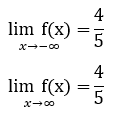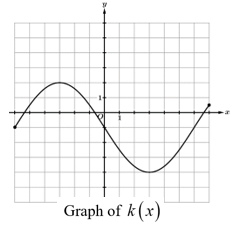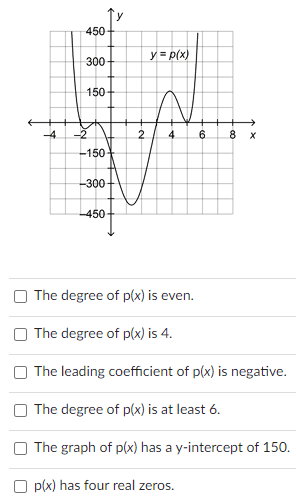Find the interval where f(x) is concave up. Justify your answer.

f(x) is concave up on (1, 4) because the average rates of change are increasing.
What is the degree of the following function?
6x^7+3x^8-2x^2
8
What is the end behavior of the following function?
(4x^3+2x^2-7)/(5x^3+6)

Horizontal Asymptote: Yes or No?
h(x) = (5x3-2x2-1)/(x4-6)
If yes, Equation:
y = 0
On what open intervals is k(x) both increasing and concave down? 
(-6,-3)
What is the leading coefficient and degree of g(x)=-3x2+5x-8x4-2
LC = -8
Degree = 4
Use the limit definition to state the end behavior of the polynomial functions.
f(X)= -8x^7+3x^2+5

Find the horizontal asymptote of
(x^3+x^2-9)/(x^5-3x^2-5x)
y = 0
What is the end behavior of a polynomial with a positive leading coefficient and odd degree?
As lim x-> infinity = infinity; lim x-> -infinity = infinity
Calculate the average rate of change of the function 𝑓(𝑥) =
x^2-9x
in the interval 2 ≤ 𝑥 ≤ 7.
0
The table gives values of a function f for selected values of x. Is the function linear or quadratic? Justify your choice?

f(x) is quadratic; f(x) has a constant second difference over equal-length input value intervals OR the rates of change are changing at a constant rate.
Where is the relative maximum of the function? (Calc. okay)
h(x)=2x^3-4x
(-0.816, 2.177)
Find the zeros of the function.
(4-x^2)/(x-2)
-2
Use the binomial theorem to expand
(2x-1)4
16x4-32x3+24x2-8x+1
What is the third term: (2x -3)6 ?
2160x4
Let
f(x)=x2-4
The average rate of change of over the interval [c, 5] is equal to 3, where c is a constant. Find the value of c.
c = -2
Let 𝒇 𝒙 be a polynomial function with the given values. Are there any guaranteed extrema? If so, state where they occur. (State the interval where it occurs)
A) 𝑓(-1)= 0, 𝑓(0)= 10, and 𝑓(10)= 0.
B) 𝑓(-9)= 7, 𝑓(0) = 4, and 𝑓(5)= 0
a) Yes, on -1<x<10
b) No guarantee
Find the zeros, vertical asymptote and holes if any.

zero x = 8 (8, 0)
VA x = 0, x = 1
Hole x = -2
What is the slant asymptote of:
f(x) = (4x3-5x+1)/(2x2+3x)
y = 2x - 3
What is the domain of a function:
(x-3)/(x2-3x)
(-infinity, 0] U [0,3] U [3, infinity)
What is the average rate of change of f(x)= 5x-4x2
-8?
Which of the following statements are true about the polynomial function p(x)?

The degree of p(x) is even.
The degree of p(x) is at least 6.
p(x) has four real zeros.
Solve the following inequality. Answer using interval notation.

(-∞,4/3] ∪(-1,2]
(x2+8x+12)/(x2-4)
a) Write in Factored form.
b) Identify the zero(s) and hole
c) Identify the vertical asymptote
d) Domain
e) Horizontal Asymptote
b) zero: x = -6 hole: x = -2
c) VA: x = 2
d) Domain: (-inf, -2]U [-2, 2] U [2, inf)
e) HA: y= 1
Write the rational function with the following properties:
The graph of f has a hole at x=2, and vertical asymptotes at x=3 and x=-5.
(x-2) / ((x-2) (x-3) (x+5))